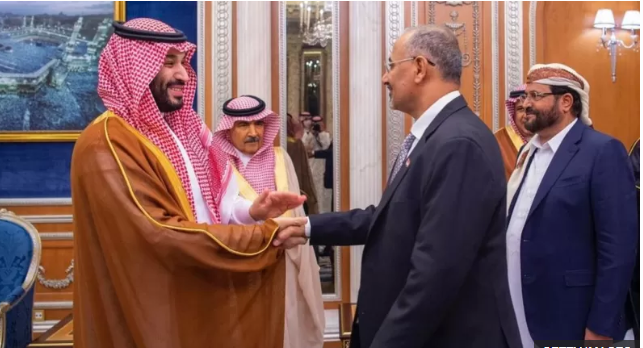The Yemeni Presiding Council of the presidency is a combination of northern and southern forces formed under pressure from Saudi Arabia and in coordination with the United Arab Emirates, and plans to hold political talks with Ansarollah.
North-affiliated figures include Rashad Mohammad al-Alimi, chairman of the Command Council and a member of the Mutmar al-Shabi al-Amm party; Sultan Ali al-Arada is affiliated with the Reform Party, Tariq Muhammad Saleh is affiliated with the Mutmar al-Shabi party and the commander of the West Shore forces, and Osman Hussein Majli is affiliated with the Mutmar al-Shabi party. The four members of the council also include personalities affiliated with the south, who are: Abdul Rahman Abu Zara’a, commander of the Amaleqah forces; Abdullah al-Alimi, a minister affiliated with the Reform Party; Eidroos Qassim al-Zubaidi, speaker of the Southern Transitional Assembly, and Faraj Salmin al-Behsani, affiliated with the Socialist Party.
The composition of this council includes forces loyal to the Saudi coalition, which have lined up against Ansarollah during these seven years with different levels and ranks.
This council is the product of the Yemeni-Yemeni dialogue minus Ansarollah in Riyadh, which was formed on the initiative of the Secretary General of the Persian Gulf Cooperation Council from March 30 to April 7 and came into being with the resignation of Mansour Hadi and his deputy, General Mohsen Al-Ahmar. The task of this council is to advance the political negotiations and to manage the current situation in the process of the transitional government, so that the talks can lead to how the government will be established in the post-crisis of Yemen.
But what paved the way for this transfer of power within the coalition was a two-month nationwide ceasefire. In fact, the parties to the Yemeni crisis responded positively to the UN proposal for a two-month ceasefire, which took effect on April 2nd. According to the ceasefire, all ground, air and naval military operations will be stopped. Under the terms of the agreement, 18 fuel-carrying ships will enter the port of Al-Hudaidah, and two flights a week will be allowed to use Sanaa Airport. Other clauses in the agreement include a meeting between the parties to agree on opening crossings in Taiz and other provinces to improve traffic within Yemen.
What is very important and key in this is the composition of this council, which intends to start the conditions of political negotiations with Ansarollah and, more importantly, to provide the grounds for a political transition to an inclusive government in Yemen. This issue, despite the conflicts and conflicts of interest on the coalition front, on the one hand, and on the other hand, in relation to Ansarollah, has various ambiguities and complexities.
The presence of Eidroos al-Zubaidi, the speaker of the Southern Transitional Assembly, who has had a wide-ranging conflict of interest with Mansour Hadi and the Reform Party over the past two years over how to govern the southern provinces, is one of the ambiguities of how the inclusive government should bring its conflicting interests to the level of symmetry with the coalition and Ansarollah in the coming political prospect and under the supposition of the formation of an inclusive government, especially since the power of the South and the strong separatist and centrifugal tendencies within them, which go back to before the unification in the 1990s and the post-union political events, will be the Achilles heel of this council and any political agreement.
On the other hand, assuming that there is unity within the council and following a clear agenda for negotiations with Ansarollah – which should first lead to the reopening of ports and airports, as well as political dialogue in a neutral country; How to manage the political negotiations that shape the inclusive government with Ansarollah’s presence is a difficult and complex and perhaps in a sense impossible mission that does not fit with the Yemeni field equations and the division of spheres of influence.
How to share power, divide positions, share the budget, hand over weapons and formulate the security and foreign policy of the future government are ambiguities that make achieving the idea of an inclusive government with the presence of all Yemeni groups more like a joke. Although this council seems to be the product of the formation of a political reality among the Saudis that the strategy of military aggression failed and the crisis eroded in order to break the resistance and resilience of Ansarollah and its allies, Riyadh is trying to convert the burden of war and conflict in Yemen to Yemeni-Yemeni confrontations. In addition, the complexities of the Yemeni political scene will turn the political negotiation process into a long and erosive one.










0 Comments